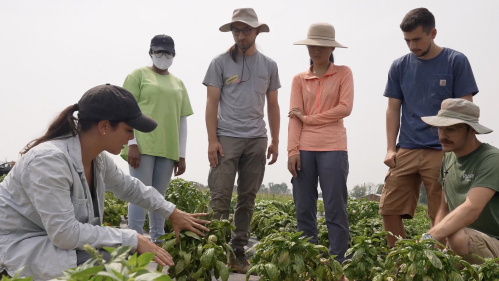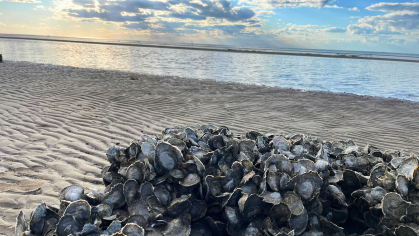Fields of Devotion provides a window into the science behind developing disease- and climate change-resistant food crops
When a devastating disease wiped out New Jersey farmers' basil fields, growers turned to Rutgers scientists for help.
Now the public will be able to follow the unique partnership between local farmers and Rutgers scientists in Fields of Devotion, a science-in-action film and the winner of the Best Climate Film award from the New York Science and Nature Film Festival. Fields of Devotion provides audiences the ability to experience the detailed science behind developing disease- and climate change-resistant food crops.
The first campus screening of the film on March 3 will be followed by a panel discussion and networking reception for farmers and scientists.
Part of a broader effort to find innovative ways to communicate science to the public, Field of Devotion reveals the challenges New Jersey farmers face from the pressures of a changing climate.
“People don’t realize how hard it is to be a farmer,” farmer John Vannini of Vannini Farms in Vineland tells the audience. “We can lose our crops within a matter of days from new diseases that come from our rapidly changing climate.”
The film spotlights the detailed work of Rutgers plant geneticists isolating genes for disease resistance in commercial basil, a high-profit crop that small family farmers depend on.
James Simon, Distinguished Professor and plant breeder at the School of Environmental and Biological Sciences (SEBS), has been working closely with New Jersey farmers for decades.
"Our team’s model for developing disease-resistant sweet basil can be applied to many other food crops,” said Simon. “What’s most important is that university scientists and farmers work together to find solutions for problems that growers face.” Simon leads the Rutgers basil breeding program along with Andy Wyenandt, an extension specialist in the Department of Plant Biology.
Fields of Devotion also represents the deep roots of Rutgers plant breeding research and exemplifies the university’s almost 150-year land-grant history of teaching, research and service to the people of New Jersey and beyond.
“Fields of Devotion effectively communicates Rutgers' commitment to academic excellence, student research and to our collective common good,” said Laura Lawson, executive dean of SEBS.
Approximately 40 undergraduates and 10 graduate students worked alongside the Rutgers scientists in the painstaking process of breeding the new sweet basil varieties.
Lara Brindisi, one of several doctoral students in the plant biology graduate program, is featured throughout the film and is excited to see the positive impact of her lab science brought to life.
“It's very meaningful to see our science directly helping family farms,” said Brindisi.
Fields of Devotions was funded by the U.S. Department of Agriculture (USDA) as part of a basil breeding grant awarded to Rutgers.
Directed by SEBS science communication researcher, Dena Seidel, Fields of Devotion is based on an original science communication model developed at Rutgers that asks the question, “Can university scientists increase their relatability and public engagement through science-in-action storytelling?”
Fields of Devotion will also be screened this spring at the Garden State Festival, the Arts and SDGs Film Festival and the Princeton Environmental Film Festival. The film is distributed by First Run Features and will soon be available to the public on Kanopy. To attend the March 3 screening of Fields of Devotion, which will be introduced to the public by USDA National Institute of Food and Agriculture National Program Leader Tom Bewick, visit the science-in-action film’s website.



